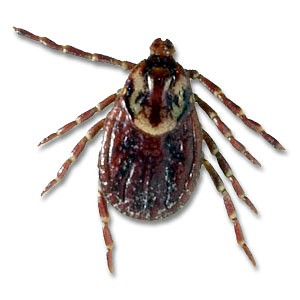Shannon York says he remembers thinking there was a spider in his hair as he ran his hand through his scalp at summer camp years ago.
He didn't give it much thought until later that day, when he got a fever.
His mom put him in a bathtub filled with ice, but the fever persisted and he ended up in the emergency room.
The spider turned out to be a tick, the kind that carries Rocky Mountain Spotted Fever, and York spent a week in the hospital, fighting an infection that can be life-threatening if untreated.
York, now the marketing and communications manager for the Siskin Children's Institute, said he has been much more careful ever since when he goes outdoors, wearing high socks and paying attention when he walks through high grass.
The lesson he learned is one health officials hope everyone in the metro area will follow as summer nears and ticks proliferate.
While Lyme disease is the most common tick-borne illness nationally, it is much less common locally. Instead, doctors worry about Rocky Mountain Spotted Fever, which, despite its name, is most common in Tennessee, North Carolina, Arkansas, Missouri and Oklahoma.
There were 603 cases reported in Tennessee in 2015, according to the Chattanooga-Hamilton County Health Department, and 11 in Hamilton County, slightly below the 10-year average of 13.
The disease is carried by the common American dog tick, according to Bev Fulbright, the manager of the health department's epidemiology department.
Rocky Mountain Spotted Fever causes a pink, spotted rash that sometimes appears around the wrists, forearms and ankles between Day 2 and Day 5 of the infection. Not everyone gets the spots - York said he doesn't remember seeing any at all.
If they appear, the spots turn deeper red or purple around Day 6, but it is important to treat the infection before that happens or it can become fatal, according to the U.S. Centers for Disease Control and Protection.
"In severe forms of the disease, you could get full-blown sepsis and could have bleeding, meningitis or encephalitis," said Dr. Paul Cornea, a physician with CHI Memorial's Infectious Disease Associates. "People could actually die from this."
The initial symptoms of a tick-borne illness sometimes are not recognized because they resemble other medical problems: "You have a fever, headache, joint pains, muscle aches - sometimes there is some confusion." Cornea said.
Initially, "some people just aren't sick enough to go to the doctor," said the health department's Fulbright.
The good news is that the same treatment - a dose of antibiotics for anywhere from one to three weeks - works for most types of tick-borne illnesses. That is why doctors often will prescribe the antibiotics even before figuring out exactly what type of tick caused your symptoms. "We have so much tick exposure around here, you might as well go ahead and treat [patients]," Cornea said.
Lots of insects bite us, but the reason we worry more about ticks than spiders or wasps or ants is that when they bite, they hang on, allowing fluid to travel from their bodies to ours.
"Typically, a tick lives in the vegetation and it's waiting for somebody to pass by," Cornea said. "It attaches to you and eventually it bites into your skin and as it feeds on the blood, it releases its intestinal contents with the bacteria."
The easiest way to avoid tick bites is to stay out of high weeds, bushes and wooded areas. Wearing light-colored long pants and shirts with long sleeves will keep ticks off of your body and make them easier to spot.
But if you are spending a lot of time outdoors and it is too hot for heavy clothing, check your body for ticks daily, because most ticks need to bite you and hang on for between 24 and 48 hours before causing problems. "Especially check areas of the body that are not easily visible, such as the armpits, the groin and behind the knees," Cornea said.
In the first few hours, "a shower will wash off any tick attached to you," said the health department's Fulbright.
Also, check your pets for ticks, particularly if they frequently go outdoors in the woods and then back indoors to lie on a sofa or bed.
While Lyme disease is the most common tick-borne infection nationally, it is not a big problem in the Southeast. Only 28 cases were reported statewide in 2015, according to the county health department, and all of those are thought to have been people who were bitten while on vacation in a state where Lyme is widespread.
Lyme is spread by deer ticks, and they are not common in the Southeast, Cornea said.
"It tends to feed on reptiles here as opposed to in the Northeast, where it is spread by a mouse and then carried by deer," he said.
Contact staff writer Steve Johnson at sjohnson@timesfreepress.com, 423-757-6673, on Twitter @stevejohnsonTFP, or on Facebook, www.facebook.com/noogahealth.
